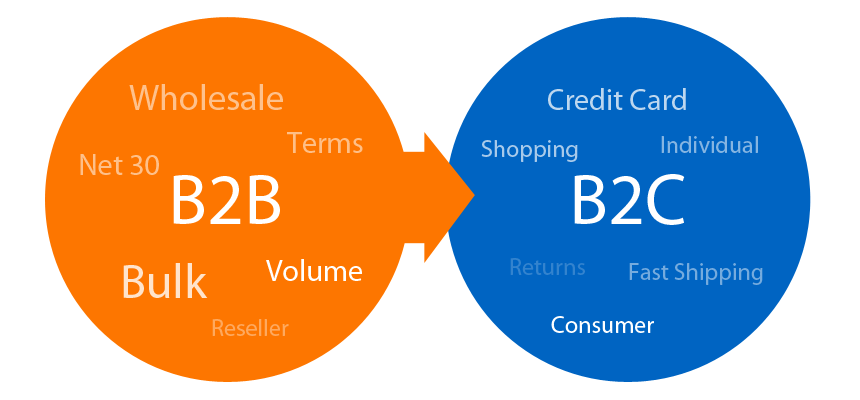B2B vs. B2C Marketing: Understanding the Differences and Strategies
In the world of marketing, two primary models dominate: Business-to-Business (B2B) and Business-to-Consumer (B2C). While both aim to sell products or services, their approaches, strategies, and target audiences differ significantly. Understanding these differences is crucial for businesses that want to optimize their marketing efforts.

What is B2B Marketing?
B2B marketing refers to the process of one business selling products or services to another business. This could include software providers selling enterprise tools to companies, manufacturers supplying raw materials, or wholesalers selling products to retailers.
Key Characteristics of B2B Marketing:
- Longer Sales Cycle: B2B purchases are often high-value and involve more decision-makers. This makes the sales process slower, typically requiring multiple meetings, negotiations, and approvals.
- Relationship-Driven: B2B marketing heavily emphasizes building long-term relationships. Trust and reliability are key factors in closing deals.
- Smaller Target Audience: Unlike B2C, where the audience can be vast, B2B marketing targets a specific group of businesses that have a need for the product or service.
- Content-Rich Marketing: B2B content marketing tends to be educational, providing in-depth information that helps businesses make informed decisions. Case studies, whitepapers, and webinars are commonly used tools.
- Personalized Communication: Sales and marketing teams often communicate directly with business executives or key decision-makers, leading to highly tailored messaging and offers.
B2B Marketing Strategies:
- Account-Based Marketing (ABM): This involves targeting specific high-value businesses with personalized marketing campaigns.
- Email Marketing: Due to the importance of relationship-building, email marketing is often used to nurture leads and stay in touch with prospects.
- Trade Shows and Conferences: Networking and direct contact play a significant role in B2B marketing, where events and exhibitions allow businesses to showcase their offerings to potential clients.
- Referral Programs: Word of mouth and referrals are powerful in the B2B world, where trust is critical. Referral programs can help generate leads from existing customers or partners.
What is B2C Marketing?
B2C marketing, on the other hand, involves businesses selling products or services directly to individual consumers. Examples of B2C marketing include a retail store advertising to shoppers or an e-commerce platform promoting products to end-users.
Key Characteristics of B2C Marketing:
- Faster Sales Cycle: Since B2C purchases are often lower in cost and simpler, the buying process is quicker and typically involves fewer decision-makers.
- Emotion-Driven: B2C marketing often appeals to consumer emotions. Brands use strategies that influence purchasing decisions based on desire, convenience, or status.
- Wider Audience: B2C targets a much broader audience, ranging from teenagers to adults, depending on the product. The communication tends to be more general to appeal to as many people as possible.
- Shorter Relationships: While some B2C businesses foster customer loyalty, the relationship is usually transactional and less personalized than in B2B marketing.
- Visual and Simple Messaging: B2C marketing messages are often visually appealing and straightforward, focusing on benefits, value propositions, and the “feel-good” aspects of a product or service.
B2C Marketing Strategies:
- Social Media Advertising: Platforms like Facebook, Instagram, and TikTok are essential for B2C brands to reach consumers and drive engagement. Social media is used for both organic content and paid ads.
- Influencer Marketing: Many B2C businesses collaborate with social media influencers to promote products, leveraging their credibility and reach to boost brand visibility.
- Discounts and Promotions: Special offers, sales events, and promotions are common tactics to attract consumers and increase immediate sales.
- SEO and Paid Search: B2C businesses invest in search engine optimization (SEO) and pay-per-click (PPC) campaigns to appear in search results and capture online shoppers’ attention.
Key Differences Between B2B and B2C Marketing:
- Audience and Buying Behavior:
- B2B customers are businesses looking for solutions to improve efficiency, increase revenue, or solve specific problems. Their decisions are based on logic and long-term value.
- B2C customers are individuals making purchases based on emotions, convenience, or immediate needs. Their decisions tend to be more impulsive and influenced by personal desires.
- Communication and Sales Approach:
- B2B marketing often involves one-on-one communications, with a focus on relationship-building, customization, and detailed product knowledge.
- B2C marketing communicates directly to the consumer through mass media or social channels, with simpler messages designed to appeal to broad emotions.
- Sales Process:
- B2B sales typically require longer decision-making processes with multiple stakeholders involved in each transaction.
- B2C sales are usually faster, driven by the consumer’s need or want, with fewer barriers to purchase.
- Content and Messaging:
- B2B content is often detailed, informative, and aimed at educating the decision-maker.
- B2C content is more emotionally charged, highlighting immediate benefits, experiences, and convenience.
- Pricing and Discounts:
- B2B transactions tend to involve custom pricing based on the order’s scale, negotiation, and long-term contracts.
- B2C pricing is typically fixed, with promotions used to encourage purchases.
Conclusion:
B2B and B2C marketing serve distinct audiences and require tailored strategies. B2B marketing is focused on fostering long-term relationships, building trust, and addressing specific business needs, while B2C marketing is driven by emotional appeals, brand loyalty, and convenience. By understanding these differences, businesses can craft more effective strategies that align with their goals and target market. Whether you’re aiming to sell to businesses or consumers, the key to success lies in understanding their motivations and meeting their needs with personalized and engaging marketing approaches.